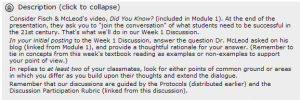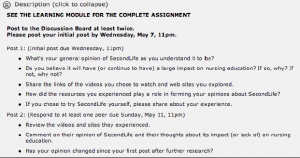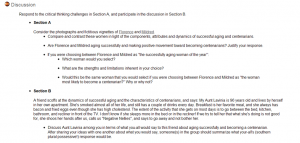Description
Discussion prompts are the written “springboard” from which online discussions are launched and are essential to encourage shared understanding (Du, Zhang, Olinzock, & Adams, 2008). Discussion prompts can vary from pithy (e.g., “Discuss [Topic X]”) to verbose (e.g., an entire printed page of instructions). However, the best standard for gauging the effectiveness of a discussion prompt may be the degree to which students engage with the topic through unique, critical, and personal substantive postings (Thompson, 2009). Explicitly described and well-structured prompts support students’ interaction and co-construction of higher order knowledge.
Discussion prompts may be displayed in the “Description” of a discussion topic, as the first posting to an online discussion, or in the body of a content module.
Dr. Linda Putchinski in UCF’s College of Business Administration has three rules for creating discussions prompts:
- Rule 1: Make the prompt relevant to your course content.
- Rule 2: Make the prompt current, such as something recently in the news.
- Rule 3: Add a bit of controversy such as an ethical twist to the prompt.
- (optional) Rule 4: Add in learner choice by allowing students to select from two alternative discussions topics.
In addition to these rules, Dr. Putchinski frequently adds in learner choice by allowing students to select from two discussions topics.
Discussion Prompt Types
Effective online discussion prompts provide a frame of reference through an associated shared experience or learning activity, but there are numerous creative ways in which this context can be brought to bear. For instance, discussion prompts may involve or invoke personal experience, hypothetical scenarios, opinions (with substantiation), student-created work, video clips, etc. (Course Discussion: Context, 2008; Course Discussion: Prompts, 2008).
Here are some ideas for discussion prompts beyond the typical “answer/reply” structure:
- Debate: Kanuka, Rourke, and Laflamme (2007) found that discussions structured like debates encouraged students to exhibit higher order cognitive skills, and Richardson and Ice (2010) found evidence of critical thinking.
- Role Play: Have students assume a fictional or non-fiction person and speak from their point of view.
- KWL: This is the “What do you know? What do you want to know? What have you learned?” structure. Baran and Correira (2009) found that this allowed students to bring in prior knowledge and helped guide the course of the discussion. The students also found that to be the efficient and effective by students, due to the fact that the structure largely kept the discussion focused and progressing.
- Application: Asking students to engage in practical applications encourages higher-order thinking. For instance, Koh, Herring and Hew (2010) found that when the discussion concerned a project-based activity, the students had to explain and defend their strategies for the activity.
- Scenario: Pose a ‘real-life’ scenario for students to address. It is helpful to provide a web resource that describes a current event.
- Review: Have students share projects/papers they are working on and ask for peer feedback.
Discussion Prompts in Student Blogging
Thompson and Wegmann (2011) found that public blogs implemented with students in place of online discussions could realize many of the benefits of online discussions. With little modification, well-constructed discussion prompts were applicable to these blog-based interactions (Thompson & Wegmann, 2011).
Link to example artifact(s)

Graduate Education Example 1

Graduate Education Example 2

Graduate Education Example 3

Graduate Nursing Example
Link to scholarly reference(s)
Baker, D.L. (2011). Designing and orchestrating online discussions. MERLOT Journal of Online Learning and Teaching, 7(3), 401-411. http://jolt.merlot.org/vol7no3/baker_0911.pdf
Baran, E., & Correria, A. (2009). Student-led facilitation strategies in online discussions. Distance Education, 30, 339-361.
Dennen, V.P. (2005). From message posting to learning dialogues: Factors affecting learner participation in asynchronous discussion. Distance Education, 26, 127-148.
De Smet, M., Van Keer, H., & Valcke, M. (2008). Blending asynchronous discussion groups and peer tutoring in higher education: An exploratory study of online peer tutoring behaviour. Computers & Education, 50, 207-223.
Du, J., Zhang, K., Olinzock, A., & Adams, J. (2008). Graduate students’ perspectives on the meaningful nature of online discussions. Journal of Interactive Learning Research, 19, 21-36. http://www.aace.org/pubs/jilr/.
Gilbert, P.K., & Dabbagh, N. (2005). How to structure online discussions for meaningful discourse: A case study. British Journal of Educational Technology, 36, 5-18.
Kanuka, H., Rourke, L., & Laflamme, E. (2007). The influence of instructional methods on the quality of online discussion. British Journal of Educational Technology, 38, 260-271.
Koh, J.H., Herring, S.C., & Hew, K.F. (2010). Project-based learning and student knowledge construction during asynchronous online discussion.The Internet and Higher Education, 13, 284-291.
Penn State Learning Design Community Hub. Pedagogical Approaches to Canvas – Discussions. from https://sites.psu.edu/pedagogicalpractices/discussion/
Richardson, J.C., & Ice, P. (2010). Investigating students’ level of critical thinking across instructional strategies in online discussions. The Internet and Higher Education, 13, 52-59.
Thompson, K. (Producer/Host). (2009, May 31). 5 design decisions to facilitate better online student engagement [Episode 4]. Of Courses Online.
Thompson, K. and Wegmann, S. (2011). Is student blogging a suitable alternative to online discussions? A connected stance applied. Presentation at Sloan-C ALN Conference, Orlando, FL.
Citation
Thompson, K., deNoyelles, A., Chen, B., & Futch, L. (2016). Create effective discussion prompts. In B. Chen & K. Thompson (Eds.), Teaching Online Pedagogical Repository. Orlando, FL: University of Central Florida Center for Distributed Learning. https://topr.online.ucf.edu/discussion-prompts/.